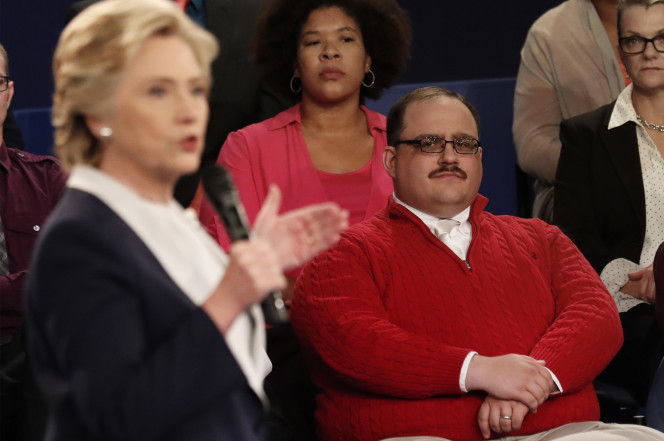The Second Presidential Debate on Oct. 9 came and passed, delivering the onslaught of ridiculousness that the world was expecting. Unexpected, though, was the individual who truly stole the show—Illinois voter Kenneth Bone. Within seconds of addressing the candidates with his question, Bone’s face and iconic red sweater had been seen across the Twitterverse. While not everyone may have watched the debate—let alone questioned what went wrong to bring us to this deplorable state of American Presidential politics—many have seen the ensuing memes of Ken Bone.
Memes are quickly becoming one of the foremost means of cultural dissemination. They allow individuals to share complicated and enigmatic human emotions through a couple lines of text overlaid over a relatable gif or screen capture. They allow us to strike a deep connection with each other whilst sitting alone, staring at our Instagram feeds. Memes have the exceptional ability to deconstruct important events, ideas, and emotions into easily absorbable, bite-size pieces. Yet this repackaging of events short-circuits their meanings, removing the element of critical thought required from the consumer.
In many instances, they turn unpleasant topics—such as the current Presidential election—into light-hearted, mass-scale inside jokes. However, this reappropriation and reinterpretation of culture reveals the menacing power of memes. Just as memes are a product of society, they have a remarkable influence in shaping it. Memes—once harmless and inconsequential—have evolved to possess significant value in informing people of the news. Social media is no longer just a vain means of attaining peer acceptance and self-validation—it controls the media that we consume and interpret. As such, memes have significant cultural influence.
Those skeptical of the relevance of memes in our offline lives need look no further than McGill itself. Just last week, internet trolls managed to mobilize thousands of Facebook users over a silverback gorilla that was shot in Ohio last May. Harambe took the campus by storm, with some opposing the supposed racism of the meme and taking issue with the fact that the McGill Harambe Candlelit Vigil event on Facebook had more people going than events such as the March for Missing and Murdered Indigenous Women. Sometimes what matters is not the content of a meme, but how people interpret and react to it.
It seems Harambe’s fifteen minutes of posthumous fame will finally elapse, and McGill will soon be ready to move on, with the closing of his Vigil this Friday. But, Harambe teaches us an important lesson: Memes may be ephemeral, trend-based entities, but they can have a significant effect on wider society.
Just like the moon and the Force, memes have a dark side. They are accessible and can be created by anyone, making them effective in promoting agendas. Memes have the ability to perpetuate not only falsities, but ignorance and hatred. For example, Pepe the Frog, a common meme of a lovably self-deprecating amphibian, was recently declared a hate symbol by the American Anti-Defamation League for his use in anti-semitic and white supremacist memes. Pepe originally represented nihilism and existential angst; however, his message was altered by white supremacists on the internet, portraying the frog gleefully engaging in racist activities. Pepe stands as proof that an otherwise unsuspecting meme can diffuse a substantive, sinister message, with great ability to influence its viewers.
Memes significantly affect our worldview, and perception of society; however, we shouldn’t allow the likes of Ken Bone, Harambe, and Pepe to shelter us from serious social and political issues. For better or for worse, memes are probably not going anywhere. In light of this, it’s important to realize the influence that memes have in the world outside of Instagram. They take the unpleasant aspects of life and make them comfortable, yet sometimes it’s only by facing these ugly truths that we can progress as a society. For all the effect that they have on us, at the end of the day, memes must be taken with a grain of salt.








